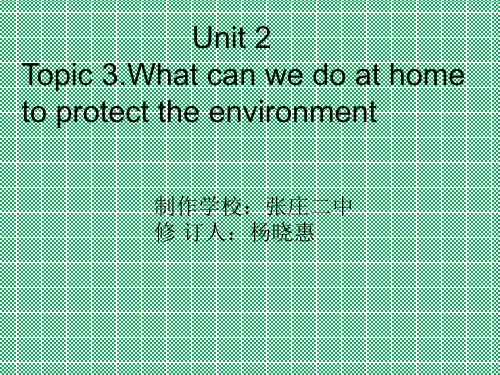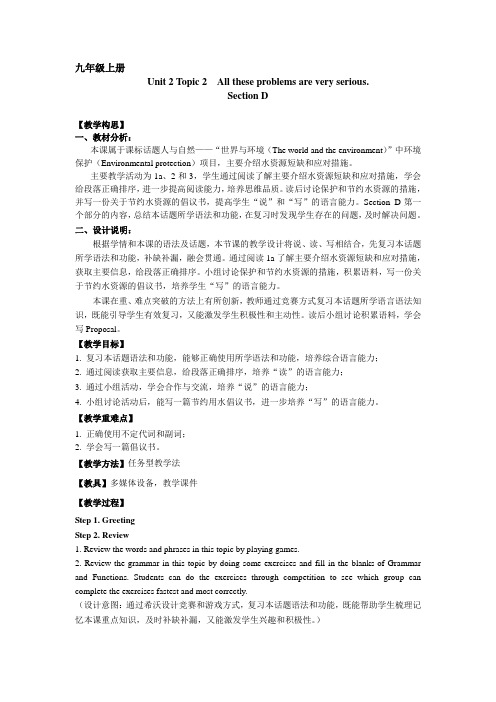仁爱版九年级英语Unit2_复习课
仁爱版九年级英语上册unit2topic3复习课件

学生在学习时,对单词,短语已经掌握,并 能在语境中运用。对并列句也能理解,初步 运用。通过本节课的复习能够进一步理解和 掌握本部分知识。
学习目标:
1. 能够说出重点单词,短语和句子的意思;并 能在语境中灵活运用。
2.能够说出本部分重点句子,并会运用。 3. 复习or,but,while,and连接的并列句。 谈论有
action German guide
1.
technology deep require nod
hurry up 短语: ought to
after all up to give up
1.Recycling
Shut off
can protect the
enrvuirnonomuetnt
,and
it
can save
• A . big B . deep C. wide D . short
Homework
• 1 Suppose you are Helen,write to Li Hong and give some advice to how to be a greener person.
• 2. Finish test paper of the part.
自学检测一(3)
• 根据汉语提示完成填空: • 1 If you want to keep healthy, you must_g_iv_e_u(p放弃
smoking。 • 2 Our drinking water has__ru_n_o_u_t__(用完)already. • 3.You’d better talk with M r. Zhou.a_f_te_r_a_ll,(毕竟) he
仁爱英语九年级上Unit2 topic1 复习课件

(三)单项选择 ( )1.—How long _____ you _____ here? • —For about two years so far. • A. have; studied B. did; live C. were; swimming ( )2.We have known each other _____ ten years ago. • A. for B. since C. about ( )3.There is _____ pollution in the world. We must stop it. • A. much too B. too much C.too many ( )4.I can’t stand _____ for you so long. • A. to wait B.waiting C.waited ( )5.—It smells terrible. What has happened here? • —Look, there is much waste gas _____ from the chemical • factory. • A. pours B.pouring C.poured
• • • • • •
4.所有的花、草和鱼儿都没有了! All the flowers, grass and fish have gone! 5.难闻极了。 It smells terrible. 6.有几个化工厂正往河里排放污水。 There are several chemical factories pouring waste water into the river. • (There be + sb. / sth. + doing sth. 表有某 人/ 某物正在做某事。)
Unit2 Topic2SectionD教案 仁爱版九年级英语上册

九年级上册Unit 2 Topic 2 All these problems are very serious.Section D【教学构思】一、教材分析:本课属于课标话题人与自然——“世界与环境(The world and the environment)”中环境保护(Environmental protection)项目,主要介绍水资源短缺和应对措施。
主要教学活动为1a、2和3,学生通过阅读了解主要介绍水资源短缺和应对措施,学会给段落正确排序,进一步提高阅读能力,培养思维品质。
读后讨论保护和节约水资源的措施,并写一份关于节约水资源的倡议书,提高学生“说”和“写”的语言能力。
Section D第一个部分的内容,总结本话题所学语法和功能,在复习时发现学生存在的问题,及时解决问题。
二、设计说明:根据学情和本课的语法及话题,本节课的教学设计将说、读、写相结合,先复习本话题所学语法和功能,补缺补漏,融会贯通。
通过阅读1a了解主要介绍水资源短缺和应对措施,获取主要信息,给段落正确排序。
小组讨论保护和节约水资源的措施,积累语料,写一份关于节约水资源的倡议书,培养学生“写”的语言能力。
本课在重、难点突破的方法上有所创新,教师通过竞赛方式复习本话题所学语言语法知识,既能引导学生有效复习,又能激发学生积极性和主动性。
读后小组讨论积累语料,学会写Proposal。
【教学目标】1. 复习本话题语法和功能,能够正确使用所学语法和功能,培养综合语言能力;2. 通过阅读获取主要信息,给段落正确排序,培养“读”的语言能力;3. 通过小组活动,学会合作与交流,培养“说”的语言能力;4. 小组讨论活动后,能写一篇节约用水倡议书,进一步培养“写”的语言能力。
【教学重难点】1. 正确使用不定代词和副词;2. 学会写一篇倡议书。
【教学方法】任务型教学法【教具】多媒体设备,教学课件【教学过程】Step 1. GreetingStep 2. Review1. Review the words and phrases in this topic by playing games.2. Review the grammar in this topic by doing some exercises and fill in the blanks of Grammar and Functions. Students can do the exercises through competition to see which group can complete the exercises fastest and most correctly.(设计意图:通过希沃设计竞赛和游戏方式,复习本话题语法和功能,既能帮助学生梳理记忆本课重点知识,及时补缺补漏,又能激发学生兴趣和积极性。
仁爱版英语九年级Unit-2-Topic-2知识点

Unit 2 Topic 2(Grade Nine)Ⅰ、词组及用法1、blow strongly 风猛吹rain heavily 下大雨2、blow away 吹走3、wash away 冲走4、cut down 砍伐,缩短cut in 插嘴,打断(说话)cut off 切断(电源,水);中断cut out 剪下;删去cut up 切碎留意:动副构造,代词必需放中间,且用宾格。
eg. cut down the trees=cut the trees down cut it/them down 5、as a result 结果as a result of…由于…eg. As a result,he passed the exam.As a result of careless,she didn’t pass the exam.6、change/turn…,into…把…变成…7、stop/prevent/keep…from sth/doing sth 阻挡(做)某事eg. Trees can stop/prevent/keep the water from washing the earth away.8、save用法(1)贮存、保存eg. Forests can save a lot of water.Save sb sth=save sth for sb 为某人保存…(2)节约、节约,避开(金钱、时间等)奢侈eg. We should save time.(3)救,挽救eg. save one’s life 挽救某人的命He saved his friend’s life in the accident.9、in danger 处在危急中in danger of…处在…的危急中10、die out 灭亡eg. Some animals are in danger of dying out.11、come to …想到,意识到,总计,总共eg. The good idea comes to him in a flash.他灵机一动,计上心来.That comes to 23 yuan, madam.总共23元,夫人.12、the importance of……的重要性eg. Many people have come to understand/realize the importance of plantingtrees.13、sth says that…用“文字,数字”表达信息(主语,是事或物)eg. It says in the newspaper that pollution is still a serious problem.The newspaper says that pollution is still a serious problem.It’s said that…据说…It’s reported that…据报道…It’s well known that…众所周知…It’s believed that…人们信任…14、here and there=everywhere 到处15、worst of all 最糟糕的是16、in the beginning 指一件事的初期17、take away 拿走,取走,带走18、escape sth/doing stheg. He is very lazy. He often escapes the study.The man escaped doing the work.escape…from…从…逃脱eg. The boy escaped successfully from that big fire.19、refer to sth/sb 谈及/提到/涉及某人或某事20、seem用法(1)It seems that+从句eg. It seems that their living conditions are very good.(2)主语+seem to do stheg. She seems to pass the test.(3)主语+seem+形容词eg. He seems very happy.21、protect/destroy the environment 爱护/破坏环境22、avoid sth/doing sth 避开eg. Try to avoid speaking loudly in the reading.How can they avoid a serious water shortage?23、be short of…短缺…缺乏…24、divide…into…把…分成…25、come into being 形成Ⅱ、辨析1、a number of…与the number of…a number of…=many+名复…很多…a great/large/small number of…eg. A large number of books have been soldthe number of+名(复)+谓(单)……的数量eg. The number of the students in our school is 3900.2、none与no one△none of+名/代词+谓语…eg. None of the girls likes/like playing the violin.——How many birds can you see in the picture?——None.——How much milk is there in the bottle?——None.△no one 没有人,不与of连用,可与else连用,作主语时,谓语动词单数。
2024年中考英语仁爱版一轮复习+九年级上册Unit+2+Topic+3+课件

can
A. modal v. 可以
B. modal v. 会,能
C. modal v. 可能
D. n. 罐子
① My pen is missing. Can yon lend me one?
A
② The boy can’t be Jim. He has gone to London.
C
③ There is only one can of meat left.
Around 2014, he began doing volunteer work to clear rubbish from the beaches and was officially registered(注册) as a volunteer in May, 2017. Li Jin immediately took the lead in a clean-up activity on the Sanya River.
“My volunteer work would be meaningless if I got paid. But the work itself is of great value. So I will continue doing the environmental protection work,” he said.
( A )4.Even after Abing got
and had a home again, he
continued to sing and play on the streets.
A. married
B. marry
C. marries
考点精讲1 marry v. 嫁;娶;结婚 The daughter has never married. 这个女儿一直没有结婚。 (教材P53 Review of Units 1-2 7)
仁爱英语九年级上册unit2知识复习课件 (共26张ppt)

A.when C.while
B.or
D.and
( ) 3.He is rich, _____ he is happy, too.
A.and
B.so
C.or
D.but
( )4.Xiao Li had an accident yesterday _____ he is in No.1 People’s Hospital now. A.but B.and C.or D.since
1.Mother ____me a new coat yesterday. I _______ it on. A. had made…have tried B. made…have tried C. has made…tried D. made…tried 2 “He ____to draw horses already”. “When ______ he ?” “ Last year ” A. learned…has B. learned…did C. has learned…has D. has learned…did 3.____ you _____ the text yet ? Yes, we ____ it two hours ago. A. Did…copy…did B. Have…copied…have C. Have…copied…did
C。考察词组see sb doing sth.
( )4 .—How long _____ you _____ here? —For about two years so far. A.have; studied B.did; live C.do; stay
4.A 本题考查现在完成时的用法。For 加一段时间。
( )5.He said that he _____ to Canada a few years ago. A.had been to B.have been to C.went
仁爱英语九年级教材讲解Unit2知识点击
Unit 2 Topic 1 Section ANew wordsNew phrasesUseful expressions知识点击1.……and you could see bees and butterflies dancing.……你能看见蜜蜂和蝴蝶在飞舞。
see...doing意为“看见……正在做……",see 此处用作感官动词,可以加宾语再加宾补。
进口袋。
Andy saw his toy dog hidden behind the door.安他看见他的玩具狗被藏在门后。
【拓展】其他的感官动词,如hear,watc 也有类似的用法。
如:Tony heard someone singing songs in the next door.托尼听到有人正在隔壁房间唱歌。
Every day lots of people go to the Tian'anmen Square to watch the flag go up.每天很多人去天安门广场看升红旗。
2.The flowers and grass have gone!鲜花和绿草都消失了!go在此处为不及物动词,意为“不复存在,不见了”。
如:The pain has gone.疼痛消失了。
【链接】go还有“变得,进展”等意思。
如:The fish is going bad.鱼快变质了。
Everything goes well. 一切都好。
3.Look,there are several chemical factories pouring waste water into the stream.看,有几个化工厂正往小溪里排放废水。
(1)pour...into…意为"向……投入"。
如:The government has poured millions of yuan into education.政府在教育上投资数百万元。
初中英语仁爱版九年级上册Unit2Topic1知识点
初中英语仁爱版九年级上册Unit2Topic1知识点Unit2 Topic1Section A1.gone(不及物动词)不复存在,不见了,丢失,失窃2.XXX有某人或某物正在做某事Eg:There are some boys running on the playground.有一些男孩正在操场上跑步。
XXX.有某人/某物做某事Eg:There is no time to think.没有时间去想了。
3.pour...into...把...倒入...4.waste(形容词)废弃的,丢弃的,无用的(名词)废弃物,废料(动词)浪费waste of time浪费时间waste of money浪费金钱Section B1.It’s difficult for sb. to do sth.做某事对某人来说很困难2.howlong多久,多长时间,用来询问或谈论某段时间,答语通常用for,since等引导的时间状语,谓语动词必须为延续性动词。
—How long have you learned English?—I have learned English for three years.3.in a bad mood不爽,心情不好。
4.bear(动词)忍受,蒙受(名词)熊,鲁莽的人XXX 忍受...,对...有耐烦Eg:Please bear with me while I ask some questions.当我发问你时,请耐烦些。
作动词时常能够stand交换,stand蒙受,禁受;忍受,容忍,常与can,could 1连用。
stand+名词/代词/doing:忍受某人/某事/做某事I can’t stand working in an offic e.我几乎受不了在办公室工作。
5.anyway不管如何,使用时常常位于句子开头迁移转变处。
6.write to写信给...Section C1.be harmful to =do harm to =be bad for对...有害harm sb./sth.伤害某人/某物Reading in the sun is XXX在太阳底下读书对眼睛有害。
仁爱英语九年级上册Unit-2-Topic-1-Section-A
into the stream.有几家化工厂正在往小溪里排放废
水。
There be…doing sth…
……有……在做某事
e.g. There are some people waiting for
the bus at the bus stop.
10.砍倒
Self-check
1.看见蜜蜂和蝴蝶正1. see bees and butterflies
在跳舞
dancing
2.多脏乱啊! 2. What a mess !
3.花草都消失了。3. The flowers and grass
4. 这里发生了什么事 have gone.
ቤተ መጻሕፍቲ ባይዱ
情?
4. What has happened here ?
B: But now the flowers and grass have
gone. village/flowers and A: What has happened here? grass
B: The villagers have destroyed them. villagers/destroy
Unit 2 Saving the Earth Topic 1 Pollution has caused
too many problems. Section A
第一页,共25页。
Teaching Aims
1. 重点短语及句型: see …doing sth.
What a mess ! The flowers and grass have gone.
第四页,共25页。
a place with
2024年中考英语仁爱版一轮复习+九年级上册Unit+2+Topic+1+课件
There are many kinds of pollution in the world. And it’s known that pollution is harmful 1. to people’s health.
Noise pollution may make people lose their hearing. People who work and live in 2. noisy (noise) conditions often go deaf. Recently, it was 3. reported (report) that many teenagers in America can hear no better than 65-year-old people do, 4. because these young people always listen to loud pop music. Cars and machines also produce too 5. much noise which makes people feel uncomfortable and unpleasant, and it can even cause high blood pressure.
his customers’ needs.
A. describe
B. realize
C. satisfy
( A )4. — Most of us think our team will win the game.
— Maybe they are right, but I still
my opinion.
— Sorry. I’ll put away all the things.
- 1、下载文档前请自行甄别文档内容的完整性,平台不提供额外的编辑、内容补充、找答案等附加服务。
- 2、"仅部分预览"的文档,不可在线预览部分如存在完整性等问题,可反馈申请退款(可完整预览的文档不适用该条件!)。
- 3、如文档侵犯您的权益,请联系客服反馈,我们会尽快为您处理(人工客服工作时间:9:00-18:30)。
I‘ll go over the grammar lesson once again,he said. 他说:我将把语法课再复习一遍。
→ He said he would go over the grammar lesson once again. 他说他将要把语法课再复习一遍。
AB.to wait B.waiting
C.waits
D.waited
(
Ch)o6.uTrhseebveorsys
made day.
child laborers A
C.work D.to work
(B )7._____ the environment is important for human
Dago.
A.for B.ever C.about D.since
( )3.There is _____ pollution in the world.
B We must stop it.
A.much too B.too much C.many too D.too many
( D)4.—Is the flower beautiful?
(A )1.—How long _____ you _____ here?
—For about two years so far.
A.have; studied C.do; stay
B.did; live D.were; swimming
( )2.We have known each other ___ ten years
them
C.all of them D.neither of
补全对话:
A:1._W__h_a__t'_s_t_h_e__m__a_t_te__r?_ B:I'm not feeling well. A:You've been like this since you got here, haven't you? B:2.__Y_e_s_,__I _h_a_v_e__.____ A:Do you know why? B:3._T__h_e__w_e_a__th__e_r_h_e__re__c_h__a_n_g_e__s_s_o__o__ft_e_n_._It's awful. One day it's
than • 20. 高血压 high blood pressure • 21. 相当多 quite a few • 22. 眼痛 have sore eyes
语法精要
引述某人的话一般采用两种形式: 一种是直接引语(Direct Speech),即原封不动地引 用原话,把它放在引号内; 另一种是间接引语(Indirect Speech),即用自己的 话加以转述,被转述的内容不放在引号内。
语法精要
直接引语变间接引语:
A. 陈述句的间接引语
直接引语是陈述句,变为间接引语时,在多数情况下都 构成一个that引导的宾语从句,引述动词通常是say, tell 等。与此同时,间接引语中的人称、时态和其他方面也 要相应有所变化。
The foreigner aid to me, I like Beijing very much.那老外 告诉我:我很喜欢北京。
had better (not) do sth. • 10. 看病 see a doctor • 11. 变聋 go deaf • 12. 听力丧失 hearing loss • 13. 据说 It is said that… • 14. 在公共场合 in public
Unit2 Topic1
• 15. 所有种类 all sorts(kinds) of… • 16. 对…..有害的 be bad for… • 17. 对…..有好处/利的 be good for… • 18. 在许多方面 in many ways • 19.同……(几乎)一样差 no better
C.poured
D.pours
( A )10.When I was walking in the street
yesterday, I saw a UFO _____ over my head.
A.flying
B.flies C.flew D.to
fly
( C)11.He said that he _____ to Canada a few
• → The teacher said me the earth moves around
the sun earth.
语法精要
时间状语、地点状语、指示代词的变化 today--------that day this week/ year------that week/year a week/ year ago-------a week/ year before here-------there this---------that 祈使句变间接引语: 改为动词不定式,引述动词常用tell,order等。 “Don’t move!”he said to me. →He told me not to move.
A.already B.yet
C.just D.ever
( )9.—It smells terrible. What has happened here?
LoBok, there is much waste gas ___ from the chemical
factory.
A.pour
B.pouring
hot, but the next day it's rainy. No matter what I wear, I'm never dressed properly. A:You have't learned to predict the weather here. I've been here for eight years, and I never get sick. B:4.__W__h__a_t_s_h_o__u_ld__I__d_o_?_______? A:Well, there's a weather hotline. Every morning you can call it to find out what the weather will be like during the day. B:I know that hotline, but I've never called it. I've heard it's expensive.
years ago.
A.had been to B.have been to C.went
( B)12D.—.gCoan’t you stop making so much
noise? I really can’t _____ it.
—I’m terribly sorry for giving you so much
(that可省略)
语法精要
直接引语变间接引语: B. 疑问句的间接引语 1.一般疑问句
一般疑问句改为间接引语时,要用陈述语序,并要加 连词if 或 whether,其主句动词常用ask, wonder, wantto know, didn't know等。句末不用问号。
My teacher asked me, Do you like American country music ?我老师问我:你喜欢美国乡村音乐吗?
trouble.
A.keep B.stand
C.hear D.make
( C )13.Trees can stop the sand _____ towards
the rich farmland in the south.
A.moving B.to move C.from moving D.moves
→ The foreigner told me that he she liked Beijing very much. 那老外告诉我说他(她)很喜欢北京。
语法精要
直接引语变间接引语: She said,We are very fond of sports. 她说:我们都喜
欢体育运动。 → She said that they were very fond of sports. 她说
语法精要
直接引语变间接引语: 如何变人称:
口诀:一随主。二随宾,第三人称不更新。
一 二第随随三主宾 人::称不更新: SHMher.esSsamaididtth.o"sKMaaiydte,b.“r"othHtheoyewrawirseayngotosuortdosbigsootyesr .n”ow?” shopping with me. ” →→SMHhr.eSsamasikdtehdhseKariadbtretohhtehoyewrwhweerarenstgeisodtoetordwgbaosysth. en。 shopping with her.
LOGO
仁爱单版击九此处年编级辑英母语版标Un题it样2式单元 归纳复习
9/21/2019
(Revision)
课件制作:陶长霞
Unit2 Topic1
• 1. 化学工厂 chemical factory • 2. 把…...倒入…… pour …into… • 3. 去野炊 have a picnic • 4. 对……有害
语法精要
直接引语变间接引语: 时态的变化: 主句为一般现在时或一般将来时态时,间接引语时态
不变;主句为过去时态时,间接引语则一般都改成 过去时态,但转述客观真理或为了表示引述的状态 和情况到现在仍然是事实时,经常用一般现在时。
• The teacher said "The earth moves around the sun .”
